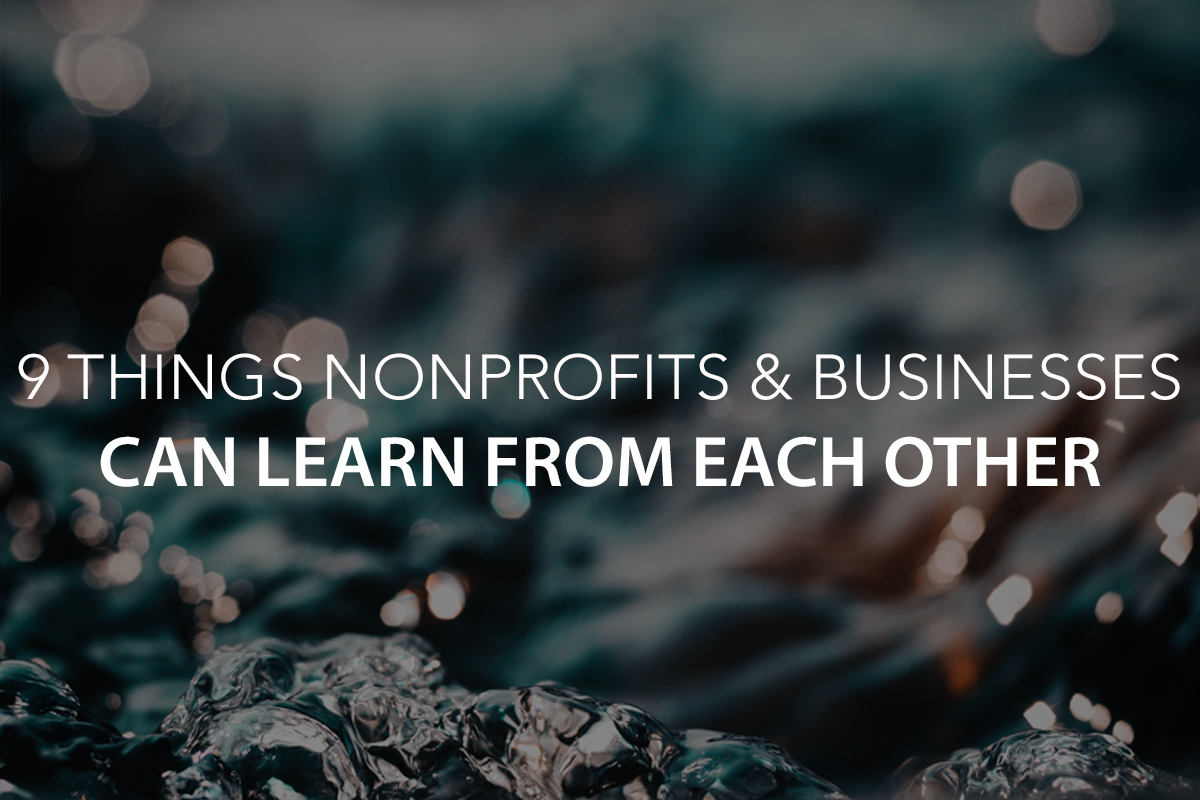Many years ago, Peter Drucker reminded us that businesses can learn a lot from nonprofits. Today, that is still true, but nonprofits can learn a lot from businesses as well. The graphic below shows 9 things nonprofits and businesses can learn from one another. Keep reading for more details on each!
What nonprofits can learn from businesses…
1. How to pursue excellence and not settle for average or mediocre quality of service or product
While not always the case, some nonprofit leaders can be heard using the excuse of “we don’t have the resources” in order to justify sub-standard quality. Successful businesses and nonprofits find a way to set themselves apart by creatively using what they do have, along with the power of vision, to deliver exceptional quality.
2. The importance of revenue generation rather than just spending
Businesses understand that you need a financial model that works, and when it doesn’t work, it needs to be corrected now – not ten years from now. Many nonprofits start with passion but do not have a sustainable financial model that results in long-term momentum.
3. How to make more decisive and timely decisions
At times, nonprofits do not respond to culture and market shifts fast enough, resulting in lost opportunities. This is sometimes the result of complex relationships between boards and CEO’s, fear of offending key donors by making strategic changes, or lack of strategic thinking.
4. The importance of paying for performance rather than just activity
Some businesses do an excellent job of defining their priorities, measuring the outcomes, and then paying those who made significant contributions to those outcomes. However, incentivizing performance is not only for the business world – it can be a valuable source of retaining top talent for nonprofits as well.
5. The importance of hard work and risk taking in driving an organization towards results
I know nonprofit leaders may hate to hear this, and while it is certainly not always the case, there are too many nonprofit managers who are resistant to doing what is required to build a successful enterprise including working hard, taking risks, and making difficult decisions.
What businesses can learn from nonprofits…
1. How a compelling mission and vision can motivate and help mobilize people
Most nonprofits are dependent upon multiple volunteers in comparison to the few people they actually employ. It’s easier to expect people to work when they are getting paid a salary and benefits, yet a good nonprofit is able to mobilize an extraordinary army of volunteers with no pay, perks or benefits. People need to feel there is a worthwhile purpose to their work.
2. How to do more with less
Some nonprofits accomplish remarkable results without the benefits of multiple executive staff, support staff, extraordinary technology, or Class A offices. Their secret is focus. Nonprofits are living proof that “more” does not always result in “better.”
3. How to be better managers of their finances since their resources are often more limited and more difficult to generate
At times, businesses can waste large amounts of money and resources that a nonprofit would never have in the first place! Some businesses throw out more than many nonprofits have to spend! This, along with money spent on perks, sometimes produces little in the way of long-term results.
4. The power of a compelling vision which results in billions of dollars being given to charitable causes without receiving anything in return
When a business produces a product or delivers a service, it results in a transaction with a customer. When a nonprofit produces a product or delivers a service, quite often it benefits the recipient but is actually paid for by someone else who gets nothing in return.
Businesses and nonprofits can learn many valuable lessons from each other, but we can also gather important insights from an outside perspective. Contact us to learn more about how our experienced consultants can serve your business, nonprofit, or church!
Jay Desko is the CEO of The Center Consulting Group and brings experience in the areas of organizational assessment, leadership coaching, decision-making, and strategic questioning. Jay’s degrees include an M.Ed. in Instructional Systems Design from Pennsylvania State University and a Ph.D. in Organizational Behavior and Leadership from The Union Institute.






![Public Speaking: Using AI Ethically & Effectively to Create a Powerful Speech [VIDEO]](https://images.squarespace-cdn.com/content/v1/571fc0ea1d07c0fd6d72c167/1763735597032-XMIKMQ1D63PRC1QJ6FVV/ai+speech+blog.png)